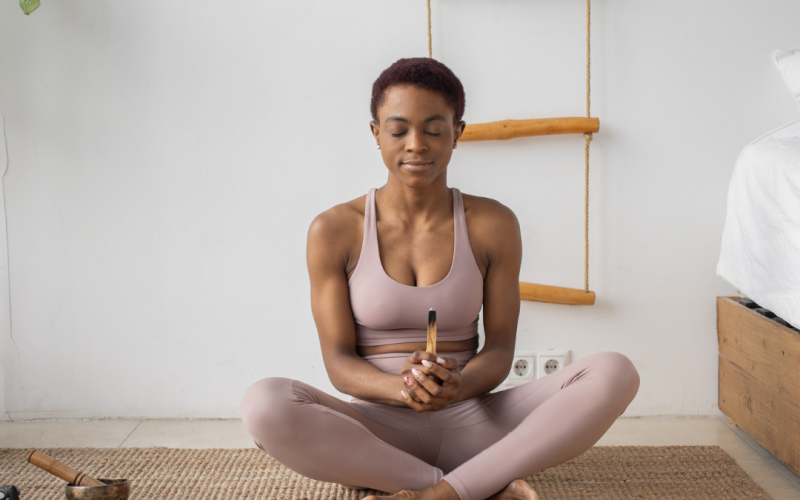Yoga originated in India thousands of years ago. Today, yoga’s practises are still relevant to people’s well-being. Yoga exercise is a holistic practise that combines physical postures (asanas), breath control (pranayama), meditation, and ethical principles to promote physical, mental, and spiritual well-being. It focuses on the unity of mind, body, and spirit. With various styles ranging from gentle and restorative to more vigorous and dynamic ones, yoga offers numerous benefits for our physical, mental, and emotional health.
We often refer to yoga as a form of exercise, relaxation, and stress management. We have various styles of yoga. Some of the most common styles of yoga include Hatha, Vinyasa, Ashtanga, Bikram, and Yin, among others. In this post, we explore the benefits of yoga and provide tips on how to start practicing yoga at home as a beginner.
What are the Physical Benefits of Yoga Exercise?
Yoga exercise improves flexibility
Regular yoga improves flexibility. When you do yoga, you are going to engage in various stretching and bending poses, and, naturally, these help to improve flexibility and range of motion in joints, muscles, and connective tissues.

Yoga increases strength and muscle tone
Many of the stretching and poses one does during a yoga session help to build muscle strength and tone. Yoga exercise engages muscles that are not mostly used in other forms of exercise, and this helps in strengthening the whole body.
Yoga Provides Better Cardiovascular Health
There are many forms of yoga, and they each serve various purposes. Some forms of yoga, such as Vinyasa or Power Yoga, are dynamic and capable of providing a cardiovascular workout that improves heart health, increases stamina, and boosts metabolism.
Enhances Respiratory Function
It is very essential to human health that the lungs are in healthy conditions. People who pay attention to their health know how important it is to keep their respiratory organs free from unnecessary complications. Yoga, to many people, is a tool they use to promote better breathing habits. Yoga incorporates breath control and deep breathing techniques, known as pranayama. Pranayam can help improve respiratory function and also increase lung capacity. This is especially beneficial to individuals with respiratory issues, such as asthma.
What are the Mental Health Benefits of Yoga Exercise
Reduces Stress and Anxiety
Relaxation is a good way to reduce stress, and regular practise of yoga lowers cortisol levels and the stress hormone. Yoga, when done consistently, also promotes a sense of calm and well-being.
Improved Mental Clarity and Focus
One of the highlights of yoga is that it aids meditation. Meditation helps us improve our mental clarity and concentration. Our self-awareness is enhanced through regular meditation. Yoga involves being present in the moment, and this is what meditation helps to achieve. So, yoga helps us to calm our minds and reduce racing thoughts, promoting a state of mental calmness.
Enhances Emotional Well-being
We become a better version of ourselves when we are in full control of our emotions. There is a peace of mind that comes with emotional stability, and this stability can only be achieved when we place our emotions under constant check. And yoga exercise can help us do that. Yoga can help regulate emotions and promote emotional well-being. During yoga, we practise mindfulness and self-awareness, and this helps us, as individuals, become more in tune with our emotions.
Improves self-care and self-awareness
We are told that regular medical checkups are essential to staying healthy. Yoga is a form of self-care that is carried out by the self. Yoga exercise helps us listen to and pay attention to our bodies, and this is a good way of promoting self-care. Constant self-awareness helps us better understand ourselves. And a good understanding of one’s body and self generally improves self-esteem and our self-care practises. Stay up to date on the newest in the world of Fashion, Arts, Beauty and Lifestyle; Follow FAB on Instagram.
Ensures Better Sleep
Medical experts have always said that a lack of good sleep is dangerous to our health. For various reasons, people suffer from a lack of quality sleep. And one of the benefits of yoga exercise is that it improves the quality of sleep. So, one of the mental benefits of yoga is that it ensures that we sleep well and faster. If you or someone you know is struggling with sleep disorders or insomnia, I recommend yoga. But it does not stop you from consulting with your doctor.
Learn How to Start Practicing Yoga at Home
Practising yoga at home can be a fulfilling and rewarding experience, but some people do not know how to go about it. Let us briefly highlight the necessary steps involved in practising yoga at home.
Create a Dedicated Space
Don’t forget that two essential parts of yoga are meditation and physical exercise, so when selecting a space to use, ensure it is a quiet place. Clear the space of any objects that may distract or obstruct your movement.
Gather your Props
There are different types of yoga, and each one comes with various forms of movement and exercise. The props you will need then depend on the particular yoga you are doing and your level of experience too. But the common props are yoga mats, blocks, straps, and bolsters. If you are new to yoga and don’t know how to make use of these props, please visit YouTube.
Choose a Yoga Style

You must have done some personal research before getting to this stage. To know which style best suits you and your body, you must know the different styles of yoga and the benefits of each. In yoga, there are various styles, such as Hatha, Vinyasa, Ashtanga, Yin, and many more. Once you familiarise yourself with the various styles, decide on the one that resonates with you and matches your skill level.
Warm Up
You need to prepare your body for the journey you are about to take it on, so start with a gentle warm-up. Start with some simple stretches of the body, joint rotations, or a few rounds of Sun Salutations to warm your body and joints. You need your body to find the right rhythm and tone before you dive deep into the yoga practises.
Follow a Sequence or Class
Unless you are already very experienced and know the different styles of yoga to the extent that you can mix exercises from different levels and techniques, I advise that you subscribe to a yoga class. It is helpful to follow a sequence or a guided online class to learn proper alignment and technique. If not, it is easy to jump from one style to another and from one level to another, and this, in the end, may contribute less or nothing to our goal.
Pay attention to your breath

It is important that you stay present and mindful throughout your practise. To achieve this, try to focus on your breath. Take slow, deep breaths in and out through your nose. Also, allow your breath to guide your movement.
Modify and Listen to your body
As individuals, our limitations vary. So pay attention to your body and listen to what it can and cannot do. Modify the poses or sequences as needed. It is very important to honour your body’s limitations and avoid pushing yourself too hard or feeling pain. Remember, always, that yoga exercise is about self-care and self-awareness. Don’t get carried away and turn yoga into a competition with others.
Clean up your Space and Body
After your practise, clean up your props and return them to their designated place. Also, clean your body by having a cool shower; this will refresh you and encourage you to maintain a consistent yoga routine.
Stay Consistent
Stay consistent. Make a commitment to practise yoga regularly at home. A regular yoga routine will help increase your flexibility, strength, and mindfulness.
Yoga is very beneficial to both the body and mind. It contributes immensely to our physical and mental well being, therefore everybody should commit to its practises. And we can do that right in our individual homes.
You are FAB!
Cheers!
Micheal
Related











